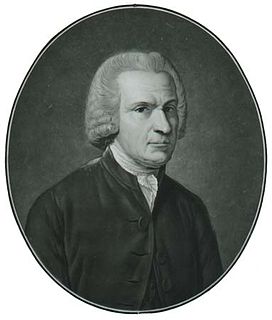A Quote by Johann Kaspar Lavater
The prudent see only the difficulties, the bold only the advantages, of a great enterprise; the hero sees both; diminishes the former and makes the latter preponderate, and so conquers.
Quote Topics
Related Quotes
If mythic violence is lawmaking, divine violence is law-?destroying; if the former sets boundaries, the latter boundlessly destroys them; if mythic violence brings at once guilt and retribution, divine power only expiates; if the former threatens, the latter strikes; if the former is bloody, the latter is lethal without spilling blood
There is a great difference, whether the poet seeks the particular for the sake of the general or sees the general in the particular. From the former procedure there ensues allegory, in which the particular serves only as illustration, as example of the general. The latter procedure, however, is genuinely the nature of poetry; it expresses something particular, without thinking of the general or pointing to it.
The difference between a man who is led by opinion or emotion and one who is led by reason. The former, whether he will or not, performs things of which he is entirely ignorant; the latter is subordinate to no one, and only does those things which he knows to be of primary importance in his life, and which on that account he desires the most; and therefore I call the former a slave, but the latter free.
The progress of science has always been the result of a close interplay between our concepts of the universe and our observations on nature. The former can only evolve out of the latter and yet the latter is also conditioned greatly by the former. Thus in our exploration of nature, the interplay between our concepts and our observations may sometimes lead to totally unexpected aspects among already familiar phenomena.
When your hero falls from grace, all fairy tales are uncovered Myth exposed and pain magnified, the grace pays uncovered He told me to be strong, but I confused to see it so weak You say never to give up, and it hurts to see what comes to be When your hero falls soley the stars, and so does the reception of tomorrow Without my hero, theres only me alone, to deal with my sorrow Your heart ceases to work, and your soul is not happy at all What are you expected to do, when your only hero falls
The sadistic person is as dependent on the submissive person as the latter is on the former; neither can live without the other. The difference is only that the sadistic person commands, exploits, hurts, humiliates, and that the masochistic person is commanded, exploited, hurt, humiliated. This is a considerable difference in a realistic sense; in a deeper emotional sense, the difference is not so great as that which they both have in common: fusion without integrity .







































